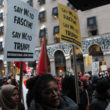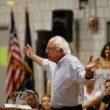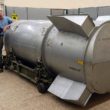Photo Credit: Anne Worner
In May, 450 American Airlines passengers slept on cots in because the Transportation Safety Administration security lines were so backed up that passengers could not make their flights.
“Predictable and preventable,” American Federation of Government Employees President J. David Cox said on NPR’s “Morning Edition” days after the O’Hare sleepover.
Speaking to NPR’s Renee Montagne, Cox argued that the agency needed 6,000 new hires.
Montagne: Now, 6,000 new screeners—that sounds pretty expensive. What kind of money are you talking about here?
Cox: Well, Renee, first off, let’s talk about the fact that 6,000 screeners would only put us back to the level that TSA was at in 2011.
Montagne: And that—those 6,000 screeners disappeared because of what?
Cox: Disappeared because Congress took the money that passengers pay on the airline tickets and used that money for other purposes instead of funding TSA. Each one of us—every time you and I or any person purchases an airline ticket . . . That money goes to fund TSA. The Congress of the United States made a decision to divert monies from that pot over to do other things instead of hiring more transportation security officers.
Cox’s comments were a brief rehearsal of his May 26 testimony before the House Subcommittee on Transportation Security.
Republicans only passed the Aviation and Transportation Act because there was overwhelming public pressure to do something.
In the written testimony, he explained that between 2013 and 2016, staffing levels for the agency fell from 47,147 to 42,525. Over the same period of time, air travel increased by 15 percent, while the Congress responded with funding for 347 officers.
Agency fees, increased by Congress in 2014, brought in more money. But Congress diverted $1.25 billion from the agency’s $7.5 billion budget to deficit reduction. This year, Congress is taking $1.3 billion from the TSA, to close the deficit gap.
Cox reminded members of the subcommittee that transportation security officers don’t have the same rights and protections that other federal workers do. The agency doesn’t comply with the Family Medical Leave Act, and it doesn’t comply with statutory protections against discrimination, which other federal agencies do. Starting salaries are $15 an hour, turnover is high, and the TSA is something of a farm team for better federal agencies.
Cox has to be circumspect, because he’s a union president making his case before a Republican congressional majority ideologically opposed to organized labor. The degradation of the TSA is, in fact, programmatic.
Congressional Republicans long ago bought into the line promoted by anti-tax, anti-government advocate Grover Norquist: “I want a government so small you can drown it in a bathtub.” They are, to use another Norquist phrase, “starving the beast.” And while starving it, Republican members of Congress, all of whom have signed Norquist’s Americans for Tax Reform pledge never to increase taxes, have disingenuously increased taxes—voting for a “user fee” paid by air travelers now queued in long lines that were created by a partisan tax hustle.
All of this is unsurprising.
Republicans in Congress were averse to the creation of a federal transportation agency in the wake of the September 11, 2001, terrorist attack, and only passed the Aviation and Transportation Act because there was overwhelming public pressure to do something.
Dick Armey, at the time majority leader, was straightforward about his opposition to a federal agency. “It’s all about union membership in a union that imposes compulsory dues that fund their [Democratic] campaigns.”
Republicans, who controlled the House when the bill was passed, worked to create an anemic agency, granting broad powers to an executive director, who can ignore certain statutory protections for workers and has the authority to deny TSA employees the right to union membership.
The end game for Republicans in Congress is one they’ve been preparing for years.
Here’s how California Republican Congressman Darrell Issa framed it in a May 26 commentary for CNN online:
These firestorms online and in the media have brought new attention to our broken airport security system, a problem that has been slowly growing for years. But if we really “hate the wait,” and want to fix it, the solution couldn’t be any simpler: let’s get the TSA out of the airport screening business altogether.
Airport administrators are scrambling to book private security firms, allowed under current law. And $34 million in emergency funding provided by Congress in May ($8 million for 734 new hires and $26 million for part-time hires and overtime) is at best a gesture.
Issa being Issa couldn’t resist the cheap shot at a beleaguered TSA work force. “We could do away with the long lines and endless sea of ‘suitcase surgeons’ in their iconic blue rubber gloves.”
Hate the wait? Call your member of Congress.







0 Comments